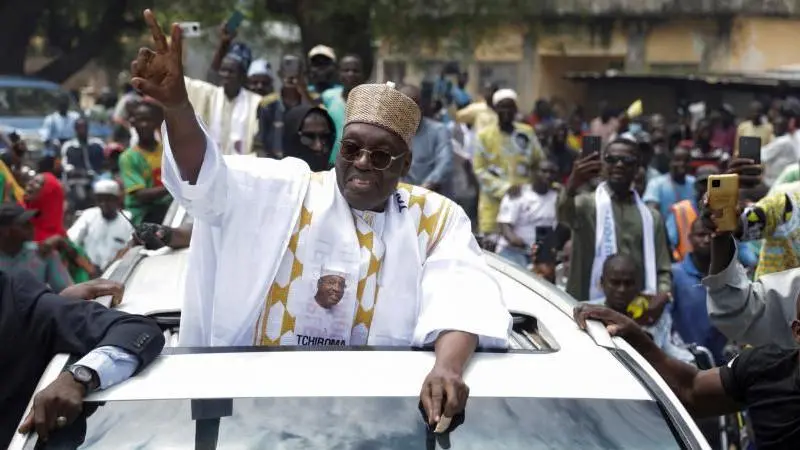Cameroon stands on a knife’s edge following one of the most fiercely contested elections in its post-independence history, as opposition candidate Issa Tchiroma Bakary declared himself the victor over President Paul Biya, the 92-year-old leader who has ruled the Central African nation for more than four decades.
Tchiroma’s announcement, made just days after the 12 October presidential election — has sent shockwaves through the capital, Yaoundé, and other major cities. The 76-year-old former government spokesman, once a loyal Biya ally, claimed he had “defeated tyranny with the will of the people,” promising to defend what he described as a legitimate victory. His defiance has sparked accusations of illegality from the ruling Cameroon People’s Democratic Movement (CPDM) and senior government figures, who insist that only the Constitutional Council has the authority to declare a winner. The Council has until 27 October to publish the official result, but few expect calm to hold that long.
Read Also:
Africa’s largest refinery, Dangote, exports first PMS to Cameroon
20 Cameroonian soldiers killed in Boko Haram attack in Nigeria
President Biya alive, active, Cameroonian Authorities insist
Tensions are already palpable. Both camps are trading accusations of fraud and manipulation, while isolated incidents of unrest have been reported. In the western town of Dschang, a local office of the ruling party was reportedly set on fire. Elsewhere, in Douala and Bamenda, opposition supporters gathered in small, scattered protests demanding transparency.
Amid the rising anxiety, Cameroon’s Catholic Church, one of the most respected moral authorities in the country has urged restraint. In a statement issued by the National Episcopal Conference of Cameroon, bishops called for peace and implored the electoral authorities to ensure that the final tally reflects “the will of the people.” Their message was pointed: “The truth shall set you free.”
The Church’s intervention carries weight in a country where religious leaders are often seen as the last credible voice of conscience. The bishops’ plea for calm echoes the growing fear that the country could again slide into unrest. Earlier this year, Monsignor Yaouda Hourgo, Bishop of Yagoua, publicly criticised Biya’s decision to seek re-election, saying it would be “better for the devil to take power” than for Cameroon to endure another seven years under his rule. Such remarks, once unthinkable, reflect the frustration of a nation weary of waiting for change.
For many Cameroonians, this election is about far more than who occupies the presidential palace. It has become a test of national identity and political survival. Since taking power in 1982, Biya has presided over a system that combines surface-level stability with entrenched stagnation. Constitutional changes in 2008 removed term limits, effectively allowing him to rule for life. Supporters credit him with maintaining peace in a volatile region; critics argue that the same peace has come at the cost of liberty, accountability and progress.
Behind the political theatre lies a country straining under multiple pressures. The Anglophone conflict that erupted in 2016 continues to fester, with separatist violence displacing hundreds of thousands and paralysing schools in the northwest and southwest. The economy, once among the most diversified in Central Africa, is faltering under corruption, unemployment and uneven development. In the northern regions, insurgents linked to Boko Haram continue to launch deadly raids, while inflation and poor infrastructure erode everyday life.
These overlapping crises have produced a mood of fatigue and defiance. Half of Cameroon’s population is under the age of 25, a generation that has known no leader other than Biya. For many, patience has run out. Motorbike taxi drivers in Douala speak of “surviving, not living.” University graduates drift between informal jobs. Even within the ruling party, murmurs of generational change grow louder.
Tchiroma’s campaign has capitalised on this disillusionment. Once a government insider, he has rebranded himself as a champion of reform and inclusion. His message, that Cameroon must break free from political paralysis, has resonated deeply among frustrated youth and the urban poor. “The people have chosen, and this choice must be respected,” he declared after casting his vote in Garoua, his northern stronghold. His supporters see him as a bridge between old power and new possibility; his detractors view him as an opportunist exploiting fatigue with the status quo.
Whether Tchiroma’s defiance signals the dawn of change or another cycle of confrontation will depend on the Constitutional Council, now under immense pressure to deliver a credible outcome. Hearings on electoral complaints began this week, with both the ruling party and the opposition lodging petitions. The Council’s verdict, expected before 27 October, will decide not only who governs but also whether Cameroonians still believe in the possibility of peaceful transition.
For now, the atmosphere remains tense but expectant. In churches, markets and taxi ranks, conversations circle back to the same question: will the truth prevail? “We have lived under one man longer than many of us have lived free,” said a young teacher in Bamenda. “If we cannot change that through the ballot box, then what is the point of voting at all?”



